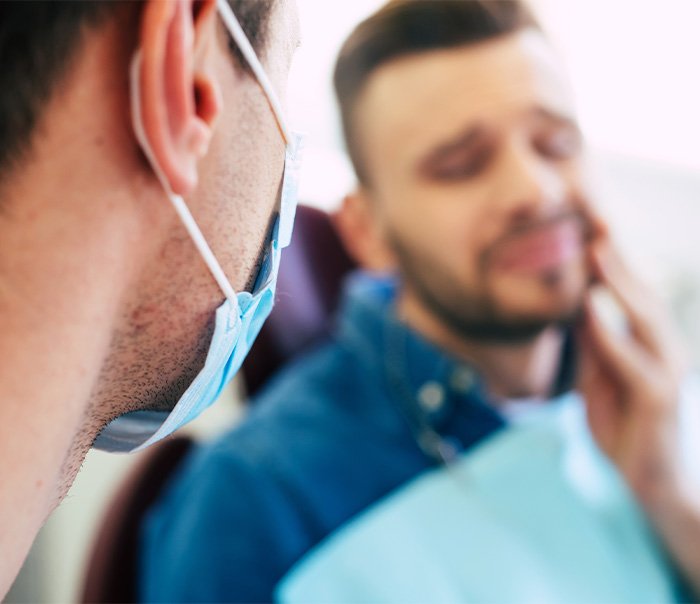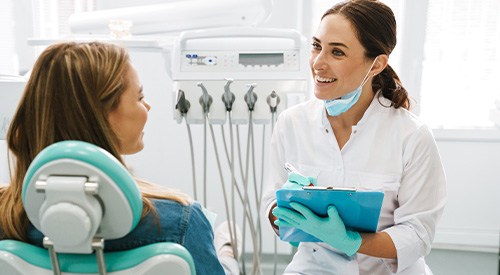Tooth Extractions – Santa Fe, NM
Removing Problematic Teeth to Save Your Smile

Your teeth are important for all kinds of practical tasks, including eating, speaking, and of course, smiling. That’s why our first choice is always to save them! That said, the ones that threaten your oral wellness sometimes cannot be restored or salvaged, and, as a result, they might need to be extracted. If that’s the case, then Dr. Zhang will ensure you’re confident about the procedure, well-prepared to make a quick recovery, and have the tooth replaced if necessary. If you’d like, you can also read on to learn more about this emergency dentistry treatment.
Why Choose Juniper Dental for Tooth Extractions?
- Same-Day Emergency Treatment Available
- Friendly and Compassionate Dental Team
- High-Quality Restorations Available
Reasons Why Tooth Extractions Are Necessary

Dr. Zhang will only suggest a tooth extraction when the tooth or teeth in question are endangering the rest of your smile, and all other avenues of treatment have been explored and deemed unviable. A few situations that often warrant tooth extraction include:
- A tooth is so damaged or decayed that a filling or another type of restoration won’t suffice.
- Gum disease has advanced to the point where the tooth cannot remain inside the mouth.
- A baby tooth hasn’t fallen out on its own.
- There are teeth that need to be removed in advance of orthodontic treatment.
The Process of Removing a Tooth

There are two types of tooth extractions. The first is a simple extraction, which involves us gently rocking the tooth loose until it’s ready to be removed. The second is a surgical extraction, which is used when the tooth is trapped underneath the gumline. In this case, we need to make a small incision in the gums to access the tooth before we work to remove it. In both cases, your mouth will be thoroughly numbed beforehand, ensuring you don’t feel any pain or discomfort during your time in the treatment chair.
Tooth Extraction Aftercare

It’s important to dedicate the days following your tooth extraction to healing. More specifically, we recommend:
- Using a cold compress to ease inflammation and discomfort
- Eating only extremely soft foods, like yogurt and cottage cheese
- Not smoking, drinking alcohol, using a straw, or spitting
- Taking prescribed or OTC pain medication as directed
- Brushing carefully around the extraction site
- Keeping your head elevated
Remember, if you have any questions regarding your tooth extraction in Santa Fe, you’re more than welcome to bring them to us! We’d be happy to provide you with the answers you’re looking for, schedule an appointment at our office, and begin the process of restoring your healthy, pain-free smile.
Tooth Extractions FAQs
Does Getting a Tooth Extracted Hurt?
Many patients in Santa Fe develop fear around dental appointments because they worry their procedure might hurt, and tooth extractions are certainly no exception. Thankfully, Dr. Zhang and the rest of our Juniper Dental team understand that you may be feeling nervous and will do everything we can to help ease your frayed nerves.
For example, before starting your treatment, we’ll apply a local anesthetic to stop the nerves in your teeth, gums, or jaw from sending pain signals to your brain. You might feel some pressure while we work, but not outright discomfort.
What is Recovery Like After Tooth Extraction?
Dr. Zhang will provide a comprehensive list of aftercare instructions for you to follow, which are intended to help you heal as quickly as possible while avoiding potential complications. Your mouth must form a blood clot over the extraction site to protect the recently exposed nerves and bone tissues. If this is damaged or dislodged, you could develop an incredibly painful side effect known as dry socket, and are more vulnerable to infection.
Many post-op orders are intended to protect and preserve this blood clot to expedite your recovery. Sample directions might include:
- Eating soft, mild foods like scrambled eggs, mashed potatoes, or applesauce.
- Drinking plenty of water from a cup, not a straw, because the force of suction can damage the clot.
- Getting lots of rest and avoid strenuous activities that elevate your blood pressure or heart rate.
- Cleaning your mouth regularly. You can start by rinsing with salt water to naturally disinfect it, then resume brushing and flossing when we give you the green light.
Can I Leave the Space Empty After My Tooth is Removed?
You might wonder if it’s simpler and less costly to leave the socket empty after your troublesome tooth has been removed. However, gaps in your grin can detract from your daily quality of life in several ways. You rely on two complete arches full of teeth to bite and chew food thoroughly, enunciate different words, and smile confidently.
Furthermore, your remaining teeth are prone to shifting out of alignment to close the space left behind, which can damage your enamel or cause injuries. As a result, we typically recommend replacing your extracted tooth as soon as you can.
What Are My Options to Replace My Extracted Tooth?
Thankfully, there are several options to choose from that can restore your smile’s appearance and functionality following your procedure. Dr. Zhang provides durable, lifelike replacements made from tooth-colored materials that can be customized to match your smile seamlessly.
For example, he can fit you with full or partial dentures to rebuild your grin, or you might be a better candidate for a dental bridge, depending on your circumstances. He has also completed the in-depth training and has the state-of-the-art equipment to provide each step of the dental implant process in the office for a more permanent solution.
